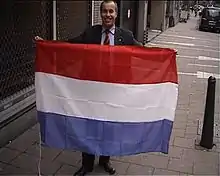Michiel Smit
Michiel Smit (born 21 August 1976) is a former Dutch politician who was leader of Nieuw Rechts, a far-right political party.
Michiel Smit | |
|---|---|
 Michiel Smit (2003) | |
| Municipal Councillor in Rotterdam | |
| In office 2002–2006 | |
| Municipal Councillor in Lansingerland | |
| In office 2006–2007 | |
| Personal details | |
| Born | Michiel Jorg Smit 21 August 1976 Maasland, Netherlands |
| Political party | Nieuw Rechts, Leefbaar Rotterdam |
Political office
Michiel Smit was elected to the Rotterdam city council in 2002 as a member of Leefbaar Rotterdam. In February 2003, he came into conflict with Leefbaar-Rotterdam leader Ronald Sørensen and decided to leave the party. After leaving, he founded a new party: Nieuw Rechts.
Views
He released his first book Nederland op z'n kop in June 2004, just before the European elections. In the book he outlines his views on Dutch society and describes what he sees as the threat of Muslim extremists in the Netherlands.
In his latest book, Veiligheid, doe het ZELF, Smit says that handguns should be legalised in the Netherlands and that doing so will lead to less violent crime.
Smit has made statements against immigration and Islam. In 2003 Smit started to cooperate with the Jewish Defense League, citing the danger to both from the Arab European League.[1] In the same year he demonstrated in Amsterdam against the pedophile association Vereniging MARTIJN as a leader of the Actiecomité Stop MARTIJN.
In 2004, photos of Smit hanging out with white power skinhead friends started circulating on the internet.[2] The following year, he lost a libel case that he started against a talk show guest who had called him a Neo-Nazi in 2002. The judge ruled that Smit had given ample reason for the qualification.[3]
References
- "Joodse Liga ook actief in Nederland". NRC Handelsblad (in Dutch). 20 September 2003. Archived from the original on 29 December 2003.
- "De lifestyle rubriek met Michiel Smit". www.geenstijl.nl (in Dutch). 11 March 2004. Retrieved 2018-10-02.
- "Hof: Michiel Smit neonazi noemen mag". De Volkskrant (in Dutch). 10 December 2005. Retrieved 2018-10-02.
External links
| Wikimedia Commons has media related to Michiel Smit. |
- (in Dutch) Official website of Michiel Smit, Internet Archive (Dec. 2002 - Oct. 2006)